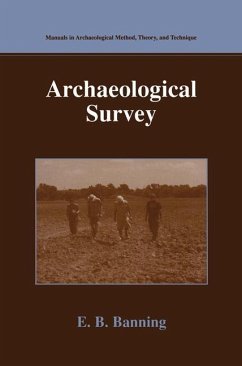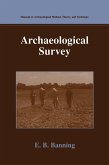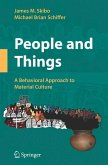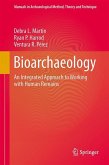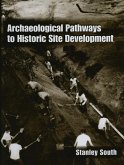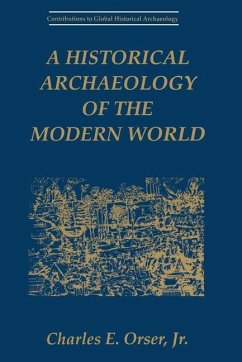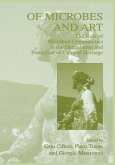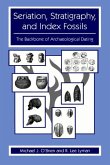This text reviews the theory, concepts, and basic methods involved in archaeological analysis. Its aim is to familiarize both students and professionals with the principles that underlie many kinds of archaeological analysis, to encourage sound laboratory practice, and to demonstrate some of the common theoretical issues that different kinds on analyses all share. Banning opens with a discussion of the nature and presentation of - and the errors in - data and briefly reviews archaeological systematics, database and research design, sampling and quantification, modeling data, and basic artifact handling and conservation. Chapters on lithics, pottery, faunal, botanical , and soil remains follow and chapters on seriation, interpreting dates, and archaeological illustration close out the book.
Intended as a text for students in upper-division-undergraduate and graduate-level courses as well as a manual for professional researchers and cultural resource management practitioners, the book is abundantly illustrated and references and includes a glossary of key terms. Suggested laboratory exercises are available on the author's university webpage:
http://homes.chass.utoronto.ca/~banning/ARH%20312/312labs.htm
Intended as a text for students in upper-division-undergraduate and graduate-level courses as well as a manual for professional researchers and cultural resource management practitioners, the book is abundantly illustrated and references and includes a glossary of key terms. Suggested laboratory exercises are available on the author's university webpage:
http://homes.chass.utoronto.ca/~banning/ARH%20312/312labs.htm
"E.B. Banning's Archaeological Survey deserves praise for gathering, in one place, a wealth of information on one of archaeology's fundamentals [...] Having read this book, though, I would not think of designing a sample survey without referring back to it [...] Archaeological Survey is the first volume in a new series, Manuals in Archaeological Method, Theory and Techniques, edited by Charles Orser and Michael Schiffer. If Banning's contribution is any guide, the Manuals will become valued and much-cited additions to archaeologists' bookshelves."
(David A. Phillips Jr. (Journal of Anthropological Research, 59, 2003)
"Although surveys have been important to archaeological research for decades, most authors address the subject in a cursory manner, often as a mere prelude to excavation. Banning (Univ. of Toronto) fills this gap with a comprehensive manual devoted exclusively to archaeological surveys. He begins with a discussion of the history of archaeological surveys and their unique contributions to archaeological research- Subsequent chapters address the goals of surveys; discuss how surveys are used to discover archaeological materials; analyze the importance of sampling; illustrate how surveys help archaeologists discover spatial structure; summarize the role of surveys in cultural resource management; and suggest several approaches to the evaluation of archaeological surveys. A thorough, up-to-date bibliography and a comprehensive index conclude the volume. Although at times the discussion can be difficult reading, the volume is generally well written and capably edited. A few more detailed examples would have helped to flesh out certain concepts, but that is a minor issue. This is the only currently available comprehensive treatment of archaeological surveys. Highly recommended."
(W. Kotter, Weber State University (Choice, July 2003)
"E.B. Banning's Archaeological Survey is a volume I would recommend to any geoscientist who wants, and perhaps even needs, to better understand what an archaeologist means by the word 'site'. The book surveys the methods, technologies, and theoretical approaches that archaeologists use to find, record, and analyze archaeological sites."
(Joe Alan Artz, University of Iowa (Geoarchaeology: An International Journal, 19:7, 2004)
"... it is far more than a mere handbook of archaeological surveying practices. It includes well-developed discussions on the theories behind them and the pros and cons of each method."
"Each aspect of archaeological survey is introduced together with the theory on which it is based, followed by a discussion of applicability and problems likely to be encountered in interpretation of data yielded. The reader will particularly benefit from these discussions, obviously based on the author's considerable personal experience and a broad knowledge ofthe subject, amply reflected in an extensive and highly eclectic bibliography."
"This work should find its place on the shelf of any serious archaeological surveyor, fledgling or seasoned hand especially interested in modern, scientific approaches. It offers the reader a virtual banquet of information that treats the subject in a comprehensive manner with surprising depth for a volume of relatively modest proportions. In addition, it is a good sourcebook with numerous citations and a large bibliography useful for directing additional queries and research. Its theoretical content, and especially the questions it raises concerning basic concepts, will be of interest to any archaeologist."
(Eliot Braun, SAS Bulletin 27 [2004])
(David A. Phillips Jr. (Journal of Anthropological Research, 59, 2003)
"Although surveys have been important to archaeological research for decades, most authors address the subject in a cursory manner, often as a mere prelude to excavation. Banning (Univ. of Toronto) fills this gap with a comprehensive manual devoted exclusively to archaeological surveys. He begins with a discussion of the history of archaeological surveys and their unique contributions to archaeological research- Subsequent chapters address the goals of surveys; discuss how surveys are used to discover archaeological materials; analyze the importance of sampling; illustrate how surveys help archaeologists discover spatial structure; summarize the role of surveys in cultural resource management; and suggest several approaches to the evaluation of archaeological surveys. A thorough, up-to-date bibliography and a comprehensive index conclude the volume. Although at times the discussion can be difficult reading, the volume is generally well written and capably edited. A few more detailed examples would have helped to flesh out certain concepts, but that is a minor issue. This is the only currently available comprehensive treatment of archaeological surveys. Highly recommended."
(W. Kotter, Weber State University (Choice, July 2003)
"E.B. Banning's Archaeological Survey is a volume I would recommend to any geoscientist who wants, and perhaps even needs, to better understand what an archaeologist means by the word 'site'. The book surveys the methods, technologies, and theoretical approaches that archaeologists use to find, record, and analyze archaeological sites."
(Joe Alan Artz, University of Iowa (Geoarchaeology: An International Journal, 19:7, 2004)
"... it is far more than a mere handbook of archaeological surveying practices. It includes well-developed discussions on the theories behind them and the pros and cons of each method."
"Each aspect of archaeological survey is introduced together with the theory on which it is based, followed by a discussion of applicability and problems likely to be encountered in interpretation of data yielded. The reader will particularly benefit from these discussions, obviously based on the author's considerable personal experience and a broad knowledge ofthe subject, amply reflected in an extensive and highly eclectic bibliography."
"This work should find its place on the shelf of any serious archaeological surveyor, fledgling or seasoned hand especially interested in modern, scientific approaches. It offers the reader a virtual banquet of information that treats the subject in a comprehensive manner with surprising depth for a volume of relatively modest proportions. In addition, it is a good sourcebook with numerous citations and a large bibliography useful for directing additional queries and research. Its theoretical content, and especially the questions it raises concerning basic concepts, will be of interest to any archaeologist."
(Eliot Braun, SAS Bulletin 27 [2004])
From the reviews:
"E.B. Banning's Archaeological Survey deserves praise for gathering, in one place, a wealth of information on one of archaeology's fundamentals [...] Having read this book, though, I would not think of designing a sample survey without referring back to it [...] Archaeological Survey is the first volume in a new series, Manuals in Archaeological Method, Theory and Techniques, edited by Charles Orser and Michael Schiffer. If Banning's contribution is any guide, the Manuals will become valued and much-cited additions to archaeologists' bookshelves." (David A. Phillips Jr. in Journal of Anthropological Research, 59 (2003)
"Although surveys have been important to archaeological research for decades, most authors address the subject in a cursory manner, often as a mere prelude to excavation. Banning (Univ. of Toronto) fills this gap with a comprehensive manual devoted exclusively to archaeological surveys. He begins with a discussion of the history of archaeological surveys and their unique contributions to archaeological research- Subsequent chapters address the goals of surveys; discuss how surveys are used to discover archaeological materials; analyze the importance of sampling; illustrate how surveys help archaeologists discover spatial structure; summarize the role of surveys in cultural resource management; and suggest several approaches to the evaluation of archaeological surveys. A thorough, up-to-date bibliography and a comprehensive index conclude the volume. Although at times the discussion can be difficult reading, the volume is generally well written and capably edited. A few more detailed examples would have helped to flesh out certain concepts, but that is a minor issue. This is the only currently available comprehensive treatment of archaeological surveys. Highly recommended." (W. Kotter, Weber State University in Choice, July 2003)
The writing style is clear and simple, with abundant examples that send us to an extensive bibliography and that facilitate understanding of the most abstract concepts. It brings a friendly approach to the mathematics, pleading for an intelligent use of a quantitative approach for the resolution of problems. It is exhaustive on the way, descending to the most basic questions of practice, but without losing a coherent structure that is based on good design of the investigation process. (Victorino Mayoral, Recensiones y Crónica Científica, 6(1), 2004)
"As the Inaugural volume in the Kluwer-Plenum Manuals in Archaeological Method, Theory, and Technique, the series is off to a promising start. Rather than a 'how to' manual, Banning's book organizes the history and theory of surveying into a complex and comprehensive overview of its practice in archaeology. In doing so, Banning provides a thougtful and thought provoking resource for archaeologists, whether they are academics, students, or consultants. Overall, this is a highly worthwhile book. It is perhaps the interdisciplinarity of the work that may be its strongest point. Banning is not afraid to look to other disciplines that employ survey or search strategies, such as geology and search-and-rescue, in order to find methodologies that will enhance archaeological survey." (David Ebert, Canadian Journal of Archaeology, 28:1)
"... it is far more than a mere handbook of archaeological surveying practices. It includes well-developed discussions on the theories behind them and the pros and cons of each method."
"Each aspect of archaeological survey is introduced together with the theory on which it is based, followed by a discussion of applicability and problems likely to be encountered in interpretation of data yielded. The reader will particularly benefit from these discussions, obviously based on the author's considerable personal experience and a broad knowledge ofthe subject, amply reflected in an extensive and highly eclectic bibliography."
"This work should find its place on the shelf of any serious archaeological surveyor, fledgling or seasoned hand especially interested in modern, scientific approaches. It offers the reader a virtual banquet of information that treats the subject in a comprehensive manner with surprising depth for a volume of relatively modest proportions. In addition, it is a good sourcebook with numerous citations and a large bibliography useful for directing additional queries and research. Its theoretical content, and especially the questions it raises concerning basic concepts, will be of interest to any archaeologist."(Eliot Braun, SAS Bulletin 27 [2004])
"E. B. Banning's Archaeological Survey is a volume I'd recommend to any geoscientist who wants, and perhaps even needs, to better understand what an archaeologist means by the word 'site'. ... The book is very readable. Banning's discussions of statistical methods, in particular, are clear and concise, with suitable references to more extensive treatments of the topics. ... I would recommend Archaeological Survey for geoscientists seeking to better understand their archaeological colleagues' paradigm." (Joe Alan Artz, Geoarchaeology, March, 2005)
"E.B. Banning's Archaeological Survey deserves praise for gathering, in one place, a wealth of information on one of archaeology's fundamentals [...] Having read this book, though, I would not think of designing a sample survey without referring back to it [...] Archaeological Survey is the first volume in a new series, Manuals in Archaeological Method, Theory and Techniques, edited by Charles Orser and Michael Schiffer. If Banning's contribution is any guide, the Manuals will become valued and much-cited additions to archaeologists' bookshelves." (David A. Phillips Jr. in Journal of Anthropological Research, 59 (2003)
"Although surveys have been important to archaeological research for decades, most authors address the subject in a cursory manner, often as a mere prelude to excavation. Banning (Univ. of Toronto) fills this gap with a comprehensive manual devoted exclusively to archaeological surveys. He begins with a discussion of the history of archaeological surveys and their unique contributions to archaeological research- Subsequent chapters address the goals of surveys; discuss how surveys are used to discover archaeological materials; analyze the importance of sampling; illustrate how surveys help archaeologists discover spatial structure; summarize the role of surveys in cultural resource management; and suggest several approaches to the evaluation of archaeological surveys. A thorough, up-to-date bibliography and a comprehensive index conclude the volume. Although at times the discussion can be difficult reading, the volume is generally well written and capably edited. A few more detailed examples would have helped to flesh out certain concepts, but that is a minor issue. This is the only currently available comprehensive treatment of archaeological surveys. Highly recommended." (W. Kotter, Weber State University in Choice, July 2003)
The writing style is clear and simple, with abundant examples that send us to an extensive bibliography and that facilitate understanding of the most abstract concepts. It brings a friendly approach to the mathematics, pleading for an intelligent use of a quantitative approach for the resolution of problems. It is exhaustive on the way, descending to the most basic questions of practice, but without losing a coherent structure that is based on good design of the investigation process. (Victorino Mayoral, Recensiones y Crónica Científica, 6(1), 2004)
"As the Inaugural volume in the Kluwer-Plenum Manuals in Archaeological Method, Theory, and Technique, the series is off to a promising start. Rather than a 'how to' manual, Banning's book organizes the history and theory of surveying into a complex and comprehensive overview of its practice in archaeology. In doing so, Banning provides a thougtful and thought provoking resource for archaeologists, whether they are academics, students, or consultants. Overall, this is a highly worthwhile book. It is perhaps the interdisciplinarity of the work that may be its strongest point. Banning is not afraid to look to other disciplines that employ survey or search strategies, such as geology and search-and-rescue, in order to find methodologies that will enhance archaeological survey." (David Ebert, Canadian Journal of Archaeology, 28:1)
"... it is far more than a mere handbook of archaeological surveying practices. It includes well-developed discussions on the theories behind them and the pros and cons of each method."
"Each aspect of archaeological survey is introduced together with the theory on which it is based, followed by a discussion of applicability and problems likely to be encountered in interpretation of data yielded. The reader will particularly benefit from these discussions, obviously based on the author's considerable personal experience and a broad knowledge ofthe subject, amply reflected in an extensive and highly eclectic bibliography."
"This work should find its place on the shelf of any serious archaeological surveyor, fledgling or seasoned hand especially interested in modern, scientific approaches. It offers the reader a virtual banquet of information that treats the subject in a comprehensive manner with surprising depth for a volume of relatively modest proportions. In addition, it is a good sourcebook with numerous citations and a large bibliography useful for directing additional queries and research. Its theoretical content, and especially the questions it raises concerning basic concepts, will be of interest to any archaeologist."(Eliot Braun, SAS Bulletin 27 [2004])
"E. B. Banning's Archaeological Survey is a volume I'd recommend to any geoscientist who wants, and perhaps even needs, to better understand what an archaeologist means by the word 'site'. ... The book is very readable. Banning's discussions of statistical methods, in particular, are clear and concise, with suitable references to more extensive treatments of the topics. ... I would recommend Archaeological Survey for geoscientists seeking to better understand their archaeological colleagues' paradigm." (Joe Alan Artz, Geoarchaeology, March, 2005)

